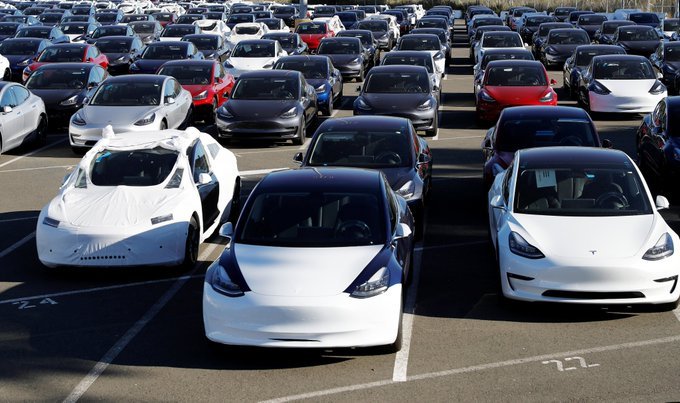Tesla Q1 2024 Delivery Numbers...
Sell the Stock or Buy the Dip?
Tesla reported delivering 386,783 vehicles in Q1 2024, marking its first year-over-year decline in deliveries since 2020.
This figure not only fell short of the anticipated 457,000 vehicles, but also represented a decrease from the 422,875 vehicles delivered in Q1 2023.
The discrepancy between Tesla's production and deliveries, with approximately 46,000 vehicles unaccounted for, indicates logistical and operational challenges impacting the company's ability to meet its delivery targets.
So, what happened?
Production Bottlenecks: Tesla cited the early phase of the production ramp of the updated Model 3 at its Fremont factory as a partial reason for the decline in volumes. Additionally, disruptions resulting from external factors such as the Red Sea conflict and an arson attack at Gigafactory Berlin further compounded these challenges.
Increased Competition: The EV market has become increasingly crowded, with domestic manufacturers in China, such as BYD, and newcomers like Xiaomi intensifying the competition. This has put pressure on Tesla to maintain its market share and necessitated strategic pricing and marketing initiatives.
Market Saturation and Demand Fluctuations: As the EV market matures, Tesla faces the challenge of sustaining growth in a landscape of evolving consumer preferences and economic conditions that may affect demand for its vehicles.
$TSLA Stock is down -6% on the news, adding to an already large decline of -33% YTD:
So what does this mean for Tesla moving forward?
Tesla's Strategic Response and Future Outlook:
Despite these challenges, Tesla remains committed to its mission of accelerating the world's transition to sustainable energy.
Investment in Innovation:
Tesla continues to invest heavily in R&D, with 2023 witnessing the highest capital expenditures and R&D expenses in the company's history. This investment is crucial for maintaining Tesla's competitive edge through technological innovation and product development.
Expansion of Production Capacity:
Tesla aims to increase its vehicle production capacity and delivery capabilities by streamlining operations and addressing bottlenecks. The ramp-up of production for the updated Model 3 and the introduction of the Cybertruck are key to this strategy, enabling Tesla to meet existing demand and capture new market segments.
Global Infrastructure Expansion:
Tesla's plans for expanding its global manufacturing and charging infrastructure are critical for supporting its growth objectives. This includes scaling up production at existing Gigafactories and exploring new locations for manufacturing and assembly facilities.
Implications for Investors and the EV Market?
The first quarter's delivery numbers, while indicative of the challenges Tesla faces, also highlight the company's enduring strengths and potential for future growth.
For investors, the key considerations include Tesla's ability to navigate short-term operational challenges, its strategic investments in innovation and capacity expansion, and the broader dynamics of the EV market.
My Take: Tesla's Q1 2024 delivery numbers serve as a reminder of the complexities inherent in the EV market and the operational challenges of scaling up production to meet global demand.
Nevertheless, Tesla's strategic focus on innovation, capacity expansion, and market penetration positions it well to overcome these challenges and continue its trajectory of growth.
For Tesla, navigating the current landscape requires a balance between operational efficiency, strategic pricing, and continued investment in the technologies that will drive the future of the automotive industry.
As the company moves forward, its ability to adapt to market dynamics and consumer preferences will be critical for sustaining its leadership position in the EV market and delivering value to its customers and shareholders alike.
Overall, I try to buy the dip and not trip 💯
Disclaimers:
- I own $TSLA stock!
- This analysis and article are for informational purposes only and should not be considered financial advice. Investment decisions should be based on individual risk tolerance and financial goals.
- We do not make personal investment recommendations and only provide research insight.
At Kurtosis, we strive to give retail investors access to quality insights and analyses.
Please consider subscribing to our newsletter and following us on X! @kurtosiscapital



